If you’re planning to work in the UK construction industry, a CSCS card (Construction Skills Certification Scheme) is essential. It acts as proof that you have the required qualifications and safety knowledge to work on-site. This guide will take you through the entire process of how to obtain a CSCS card, from the qualifications you need to the application process.
What is a CSCS Card?

A CSCS card is a credential that demonstrates that an individual working on a construction site has the necessary training and qualifications for the role they perform.
Although not a legal requirement, it’s widely accepted by UK construction employers as a standard for competency and safety awareness. There are different types of CSCS cards based on an individual’s role and qualifications, ensuring that workers meet specific standards within the industry.
Why Do You Need a CSCS Card?
While having a CSCS card isn’t legally required, most construction employers will demand one for access to job sites. The card helps ensure that all workers are trained in health and safety practices, reducing accidents and promoting a safer working environment.
Holding a CSCS card also enhances your employability, as it shows that you meet the industry’s expectations for competence.
What Types of CSCS Cards Are Available?
There are several types of CSCS cards, each catering to different roles, qualifications, and experience levels in the construction industry. Below are the main card types along with their qualifications, validity, and requirements.
Academically Qualified Person (AQP) Card
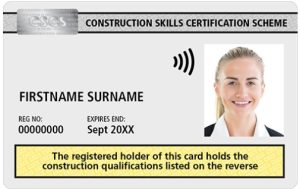
Image – Source
The Academically Qualified Person (AQP) card is available to individuals who have completed specific construction-related academic qualifications, such as degrees, HNDs, HNCs, CIOB certificates, or NEBOSH diplomas. This card is ideal for professionals who have academic backgrounds in construction but may not have completed a traditional vocational route like an NVQ.
- Validity: The card is valid for five years, after which you must apply for a new card if your qualification is still valid.
- How to Apply: You’ll need to submit proof of your academic qualification, such as a degree certificate. You may also need to provide documentation showing the units you completed during your studies.
- Test Requirement: Applicants must pass the CITB Managers and Professionals Health, Safety, and Environment Test or the CIC Health and Safety Test to qualify for the card. These tests ensure you understand critical health and safety regulations in the construction industry.
This card is ideal for people like architects, engineers, or site managers who come from a more academic background rather than traditional vocational training.
Apprentice Card
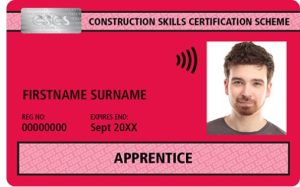
Image – Source
The Apprentice card is for individuals who are currently enrolled in a recognised construction apprenticeship. This card is essential for gaining entry to job sites while completing your training and ensuring you’re progressing towards more advanced qualifications.
- Validity: The card is valid for four years and six months, and it cannot be renewed. Apprentices are expected to complete their apprenticeship before the card expires and transition to a skilled worker card (e.g., the Blue Skilled Worker card).
- Cost: This card is issued free of charge, making it an accessible option for individuals starting their career in construction.
This card provides valuable on-the-job experience while an apprentice is gaining formal qualifications.
Blue Skilled Worker Card
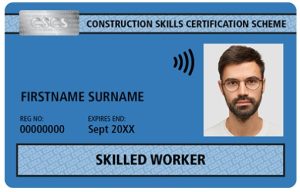
Image – Source
The Blue Skilled Worker card is for individuals who have completed a construction-related NVQ/SVQ Level 2 or equivalent qualifications. This card is common for workers who have the skills necessary to perform more complex tasks on-site.
- Qualifications: You can apply for this card if you’ve completed an NVQ Level 2, or other recognised construction apprenticeships such as the City and Guilds Craft Certificate. If you have on-the-job experience but haven’t completed an NVQ yet, you can apply for the Experienced Worker Card.
- Validity: The card is valid for five years, after which it needs to be renewed.
- Test Requirement: Applicants must pass the CITB Health, Safety, and Environment Test at the relevant level for their occupation.
This card indicates that you are skilled in your trade and can perform work independently.
Experienced Technical, Supervisor, or Manager Card
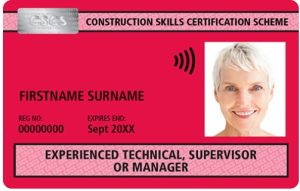
Image – Source
The Experienced Technical, Supervisor, or Manager card is a temporary card for those who have experience in supervisory or technical roles but are currently completing the necessary qualifications for a permanent card.
- Qualifications: Applicants must be enrolled in a NVQ/SVQ Level 3 or higher in a technical or supervisory field.
- Validity: This card is valid for three years and cannot be renewed. You are expected to complete your qualification within this period and then apply for a skilled worker card.
- Test Requirement: You must pass the CITB Health, Safety, and Environment Test at the appropriate level for your role.
This card helps individuals transition from experience-based roles to more formal qualifications.
Experienced Worker Card
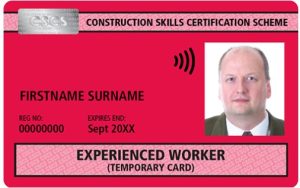
Image – Source
The Experienced Worker card is designed for those who have at least one year of experience in the last three years but have not yet achieved an NVQ/SVQ qualification.
- Validity: The card is valid for one year and cannot be renewed, meaning you are expected to complete your qualification within this period.
- Test Requirement: Applicants must pass the CITB Health, Safety, and Environment Test relevant to their occupation.
This is a temporary card allowing experienced workers to gain the qualifications they need to apply for a permanent card.
Gold Skilled Worker Card
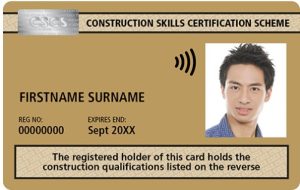
Image – Source
The Gold Skilled Worker card is for individuals with higher-level qualifications such as NVQ/SVQ Level 3 or those who have completed an advanced apprenticeship.
- Validity: The card is valid for five years.
- Test Requirement: Applicants must pass the CITB Health, Safety, and Environment Test at the appropriate level.
This card is a step up from the Blue Skilled Worker card, showing a higher level of skill and experience.
Industry Placement Card
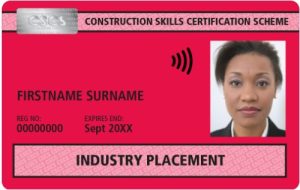
Image – Source
The Industry Placement card is for individuals who are undergoing a construction-related qualification that requires a minimum 30-day work placement, such as T-Levels or Trainee Skills Development Programs.
- Validity: The card is valid for three years and cannot be renewed.
- Test Requirement: Applicants must pass the CITB Health, Safety, and Environment Test.
This card is ideal for students or trainees gaining practical experience in the construction industry.
Labourer Card
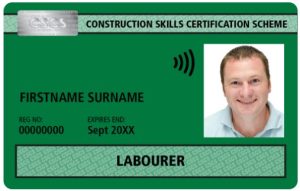
Image – Source
The Labourer card is for unskilled workers who are not on a recognised training pathway. It is typically used by individuals performing basic tasks that don’t require specific qualifications.
- Validity: The card is valid for five years and cannot be renewed. After expiration, individuals must apply for a new card.
- Test Requirement: Applicants must pass the CITB Health, Safety, and Environment Test for operatives.
This card is specifically for those who perform non-skilled roles on construction sites.
Manager Card
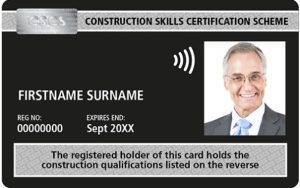
Image – Source
The Manager card is for individuals in managerial positions in the construction industry who have achieved an NVQ/SVQ Level 4, 5, 6, or 7 in a construction management-related qualification.
- Validity: The card is valid for five years.
- Test Requirement: Applicants must pass the CITB Managers and Professionals Health, Safety, and Environment Test.
This card is ideal for construction site managers who oversee projects and teams.
Professionally Qualified Person (PQP) Card
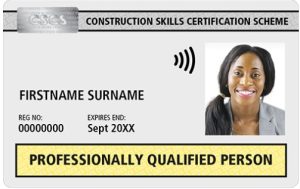
Image – Source
The Professionally Qualified Person (PQP) card is for individuals who are members of CSCS-approved professional bodies.
- Validity: The card is valid for five years.
- Test Requirement: Applicants must pass the CITB Managers and Professionals Health, Safety, and Environment Test or the CIC Health and Safety Test.
Applicants must provide proof of membership in a CSCS-approved professional body.
Provisional Card
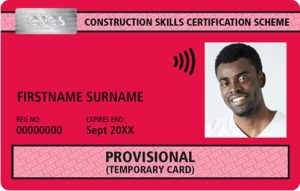
Image – Source
The Provisional card is a temporary card for individuals working through a probationary period. It lasts for six months and is not renewable.
- Test Requirement: Applicants must pass the CITB Health, Safety, and Environment Test.
This card is suitable for workers in temporary roles or on probation.
Supervisory Card
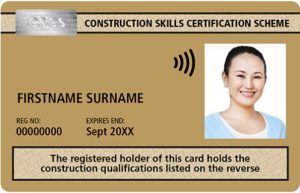
Image – Source
The Supervisory card is for those in supervisory or technical occupations who have completed an NVQ/SVQ Level 3 or 4 in a construction-related discipline.
- Validity: The card is valid for five years.
- Test Requirement: Applicants must pass the CITB Specialist Supervisory Health, Safety, and Environment Test.
This card is intended for individuals in supervisory positions who oversee site operations.
Trainee Card
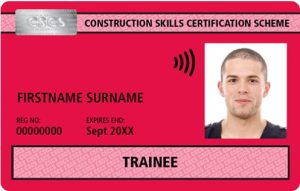
Image – Source
The Trainee card is available to those registered for a construction-related qualification. It is valid for five years and cannot be renewed.
- Test Requirement: Applicants must pass the CITB Health, Safety, and Environment Test.
This card is intended for those gaining qualifications before moving on to a skilled worker role.
What Qualifications Do You Need to Apply for a CSCS Card?
To qualify for a skilled CSCS card, you must possess a nationally recognised construction-related qualification. This ensures that you have the necessary competence and training to perform specific roles within the UK construction industry. Here’s a more detailed look at the qualifications you can use to apply for various CSCS cards, and what to do if you don’t currently hold the right qualification.
If you don’t have a recognised qualification yet, CSCS can issue you a temporary card. This allows you to continue working while you are in the process of gaining the required qualification. Keep in mind, CSCS does not directly offer courses or exams; it only issues the cards. You’ll need to arrange your qualification through a college or training provider. You can use the OFQUAL register of regulated qualifications to find relevant institutions and programs.
Qualifications Accepted for CSCS Cards
National Vocational Qualifications (NVQs)
NVQs (National Vocational Qualifications) are the most common qualifications accepted for CSCS cards. They assess your competence in a particular skill or trade by measuring your ability to meet national standards for that occupation.
- Framework: NVQs follow a structured set of standards known as the National Occupational Standard, which outlines the skills required for each role.
- Levels:
- Level 2 NVQs: Required for the Blue Skilled Worker card. This demonstrates that you have the skills to perform your job to industry standards.
- Level 3 NVQs: Required for the Gold Skilled Worker card, showing that you have more advanced skills and can work in supervisory or more complex roles.
- Level 5, 6, and 7 NVQs: These are required for the Black Manager card, which is aimed at individuals in management or high-level technical roles in construction.
- Assessment Process: NVQs are assessed on a combination of practical work and a portfolio of evidence. This is typically done by an assessor who observes your work on-site and interviews you about your tasks. Each unit of the NVQ is signed off as you demonstrate competence in that area.
- Fast-Track Options: Experienced workers can opt for On-Site Assessment (OSAT) or Experienced Worker Practical Assessments (EWPA), which allow them to obtain an NVQ more quickly. These methods are typically cheaper and faster than the traditional NVQ route but are only available for workers with several years of experience.
- Scottish Equivalent: In Scotland, the equivalent of an NVQ is the Scottish Vocational Qualification (SVQ), which follows a similar structure.
Cards available: Skilled Worker Card, Advanced Craft Card, Supervisor Card, Manager Card.
Apprenticeships

Apprenticeships are a formal training route where individuals work while studying for a recognised construction qualification. During an apprenticeship, you are employed and trained by your employer, which gives you both practical experience and theoretical knowledge. This is followed by an end-point assessment.
- Cards available: Upon completion of a recognised apprenticeship, you can apply for either the Skilled Worker Card or the Advanced Craft Card, depending on the apprenticeship level.
Apprenticeships are highly regarded in the construction industry, as they offer hands-on training in a real-world environment, combined with classroom learning.
Higher National Certificates (HNCs) and Higher National Diplomas (HNDs)
HNCs (Higher National Certificates) and HNDs (Higher National Diplomas) are technical qualifications offered by further and higher education colleges. They focus on the practical aspects of construction-related disciplines, such as civil engineering, building services, and construction technology.
- HNC: A Level 4 qualification, usually completed in one year full-time or two years part-time.
- HND: A Level 5 qualification, which is more advanced than an HNC and typically takes two years to complete full-time, or four years part-time.
These qualifications are essential for individuals in technical roles, and they provide a solid foundation in construction theory and practice.
Cards available: Academically Qualified Person (AQP) card, for those who have completed an HNC or HND.
Degrees and Postgraduate Diplomas and Certificates
A degree is an academic qualification awarded by universities. Bachelor’s, Master’s, and Doctoral degrees are recognised at different levels, though not all degree levels qualify for a CSCS card. Typically, construction-related degrees such as civil engineering, quantity surveying, or architecture are considered.
- Cards available: The AQP card is available for individuals who have completed relevant degrees or postgraduate diplomas and certificates.
Professional Body Membership
Membership in a CSCS-approved professional body is also recognised as an equivalent qualification. Many professional bodies assess their members through examinations and career experience, ensuring their competence in the construction field.
- Examples of professional bodies: The Chartered Institute of Building (CIOB), the Institution of Civil Engineers (ICE), and others.
Cards available: The Professionally Qualified Person (PQP) card.
Historical Qualifications
CSCS recognises that some workers may hold historical qualifications that are no longer offered but are still valid for a CSCS card. These include:
- City and Guilds Craft/Advanced Craft Certificates.
- Employer/Indentured Apprenticeships.
If you hold such qualifications, you can submit them to CSCS for review to determine if you qualify for a card.
Overseas Qualifications
If you have a construction-related qualification from outside the UK, you can apply for an Industry Skills Statement from Ecctis (formerly UK NARIC). Ecctis assesses foreign qualifications to determine whether they meet UK standards. If your qualification is accepted, you can proceed with your CSCS card application.
- Documentation required:
- Industry Skills Statement from Ecctis.
- Primary Source Verification (PSV) Report to confirm the authenticity of the qualification.
- Translated copies of your qualification, if necessary.
CSCS Apprenticeship Recognition Policy

CSCS recognises completed apprenticeships from across the UK. This policy ensures that all nationally recognised apprenticeships from England, Scotland, Wales, Northern Ireland, and the Isle of Man are accepted for CSCS cards.
- Free Apprentice Card: Individuals in apprenticeships can apply for a free CSCS Apprentice card.
- Skilled Worker Card: Once you complete your apprenticeship, you can apply for the relevant skilled CSCS card.
Funding for Training
While CSCS doesn’t provide funding, there are various options available to help with the cost of training and qualifications:
- CITB Levy and Grant System: If you work for a CITB-registered employer, you may be able to claim grants to cover the cost of training.
- Local Funding: Check with local training providers and Local Enterprise Partnerships (LEPs) for potential funding options.
- Unemployment Support: If you are unemployed, your local Job Centre can offer advice on available funding. The B&CE Charitable Trust also offers grants to unemployed construction workers with at least 12 months of experience.
These funding options ensure that individuals from all backgrounds can access the training they need to qualify for a CSCS card.
What Is the CITB Health, Safety, and Environment Test?
The CITB HS&E Test plays a fundamental role in the UK construction industry by ensuring that workers are knowledgeable about safety practices on-site. It is also a key component in the process of obtaining a Construction Skills Certification Scheme (CSCS) card, which demonstrates competence to employers and clients alike.
- Test Purpose: It assesses a worker’s understanding of basic health, safety, and environmental concerns within a construction setting. Passing this test is a prerequisite for receiving many types of CSCS cards.
- Cost: The test fee is £22.50, and you can purchase vouchers ahead of time for use at Pearson Professional Centres.
- Booking: The test can be booked online or via phone. Vouchers may also be used for payment, but they must be redeemed at a Pearson centre.
Types of HS&E Tests
There are three types of HS&E tests available, depending on your role in the construction industry. Each test is tailored to different levels of responsibility and expertise, ensuring workers understand the safety concerns relevant to their specific role.
Operatives HS&E Test
This test is designed for general construction workers and ensures they have a fundamental understanding of health, safety, and environmental issues before working on-site.
Test Coverage: It covers five core areas:
- Working Environment: Ensuring a safe workspace.
- Occupational Health: Managing personal health risks.
- Safety: Recognizing hazards and knowing how to avoid them.
- High-Risk Activities: Handling tasks that involve more danger.
- Specialist Knowledge: Information for specialized trades.
Pass Mark: To pass, candidates must score 90%, answering 45 out of 50 questions correctly.
Preparation: CITB provides preparation materials, including the GT100 publication (available as a book or digital download), and a smartphone app with test simulations. The app is available in 14 voiceover languages, offering a flexible and accessible way to prepare.
Specialist HS&E Test
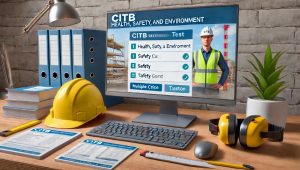
This test is intended for specialists in various trades within construction. It covers the five core areas of the Operatives test, but with additional, trade-specific questions based on the individual’s area of expertise.
Specialist Areas:
- Supervisory roles
- Plumbing (JIB)
- Demolition
- Highway works
- Lifts and escalators
- HVACR (Heating, Ventilation, and Air Conditioning)
- Work at height, among others.
Pass Mark: Like the Operatives test, the pass mark is 90%.
Preparation: Similar to the Operatives test, the GT100 publication and mobile apps help with revision, and practice exams can highlight areas that need further study.
Managers and Professionals (MAP) HS&E Test
Updated in June 2023, the Managers and Professionals test assesses a more comprehensive range of knowledge areas, reflecting the responsibilities of senior roles in construction. This test is designed to ensure managers understand not only health and safety but also legal and environmental aspects of their work.
Test Sections:
- Legal and Management: Understanding legal obligations and management responsibilities.
- Occupational Health, Wellbeing, and Welfare: Ensuring the welfare of the workforce.
- General Safety: Covering core safety procedures.
- High-Risk Activities: Managing tasks that involve significant hazards.
- Environment: Focusing on minimizing environmental impacts.
Pass Mark: You must answer 45 out of 50 questions correctly (90%) to pass.
Preparation: CITB offers an app (available on the Apple App Store and Google Play Store) for £6.99, along with downloadable revision tools and books to help candidates prepare. The CITB GT200 revision book covers all the topics in detail. The breadth of topics is wider than previous versions, so thorough preparation is advised.
Structure of the Tests
All versions of the HS&E test follow a similar format:
- Duration: Each test lasts 45 minutes.
- Questions: There are 50 multiple-choice questions per test.
- Assessment Criteria: The tests aim to measure candidates’ understanding of safe working practices and how to apply them in real-world scenarios.
Each test is regularly updated to ensure it reflects current legislation, working practices, and technology developments in the construction industry. This keeps workers’ knowledge up to date with the latest health and safety standards.
Test Preparation and Revision Materials
CITB offers several revision resources to help candidates prepare for the HS&E test, ensuring they understand the wide range of topics covered:
- Mobile App: Available for £6.99, the app offers practice questions, mock tests, and feedback on performance to help candidates prepare.
- PC Downloads: For £12.25, candidates can download software to simulate the test environment, offering another way to prepare.
- GT200 Revision Book: This official CITB book covers the core areas of the HS&E tests and is available from the CITB shop. It is essential for those who prefer studying from a hard copy.
- Sample Tests: CITB offers free sample tests on their website. These provide an overview of the type of questions you will encounter during the actual test, though they should not be used in isolation for revision.
Special Assistance for the Test
CITB offers several types of special assistance for individuals who may need support while taking the HS&E test:
- Voiceovers: Available in multiple languages, including English, Welsh, and 12 other languages. Candidates can listen to the questions while answering them.
- British Sign Language (BSL) Interpreter: Available for those who need assistance from a BSL signer.
- Reader/Recorder: A reader can read the test questions aloud to the candidate, and a recorder can input the answers as given.
- Separate Rooms and Extra Time: Candidates who need assistance such as a translator, BSL interpreter, or reader/recorder can request a separate room and additional time for their test.
Are There Alternatives to Taking the CITB Health, Safety & Environment Test?
Yes, there are alternatives to the CITB Health, Safety & Environment (HS&E) Test for certain applicants. If you qualify for one of these alternatives, you can bypass the CITB test when applying for your CSCS card. However, you will need to submit a passport-style photograph as part of your application, along with any supporting evidence for the alternative.
Here are the main alternatives to taking the CITB HS&E Test:
1. Apprenticeship Health and Safety Requirements
If you are currently enrolled in a recognised apprenticeship, you may be exempt from taking the CITB test. Applicants for the CSCS Apprentice Card do not need to take the test if they have completed the health and safety requirements set by their Apprenticeship Managing Agency within the last two years.
Accepted Evidence:
- A letter or email from the Managing Agency confirming that you have met their health and safety requirements. The letter must clearly identify the agency as the apprenticeship’s Managing Agency.
- A certificate for completing a one-day Construction Health and Safety Awareness course.
- Proof of completing a Construction Health and Safety Unit during your apprenticeship induction or qualification.
This exemption allows apprentices to gain a CSCS card based on their in-apprenticeship training rather than taking the CITB test.
2. CIC Health and Safety Test
The CIC Health and Safety Test is an accepted alternative to the CITB test for applicants applying for the Academically Qualified Person (AQP) Card or the Professionally Qualified Person (PQP) Card. However, this test is not accepted for other CSCS cards.
Key Points:
- The CIC test must have been passed within two years of the CSCS card application.
- The test is suitable for individuals applying for AQP or PQP cards only.
- The CIC test is usually provided in groups (minimum order of five courses), making it less suitable for individual or self-employed applicants.
If you have passed this test and are applying for an AQP or PQP card, you can use it in place of the CITB Managers and Professionals Health, Safety & Environment Test.
3. SOLAS Card (Ireland)
CSCS has a mutual recognition agreement with the SOLAS Safe Pass (previously known as FÁS). If you hold a SOLAS card, it can serve as an exemption to the CITB test for those applying for an Operative or Specialist CSCS card, provided that the SOLAS training was completed within two years of your CSCS card application.
Important Restrictions: The SOLAS card cannot be used as an exemption for the Supervisor or Manager and Professionals (MAP) level CITB Health, Safety & Environment Tests.
This allows workers who completed their SOLAS training in Ireland to apply for their CSCS card without taking the UK-based CITB test.
4. Previous S/NVQ Completion (Exemption Withdrawn)
Previously, applicants who had completed a construction-related S/NVQ within two years were exempt from taking the CITB HS&E test. However, this exemption was withdrawn as of September 2, 2019. If you completed your S/NVQ before this date, you are no longer eligible for this exemption and must now take the CITB Health, Safety & Environment Test.
How Do You Apply for a CSCS Card?

Applying for a CSCS card is a straightforward process, but it requires careful preparation to ensure you submit all the necessary documentation. All applications must be made through the CSCS Online platform, and it’s important to follow the correct steps to avoid delays or rejection.
Step-by-Step Guide to Applying for a CSCS Card
Use the CSCS Card Finder:
Before beginning your application, use the Card Finder tool on the CSCS website. This tool helps you identify the right type of card based on your occupation and experience level in the construction industry. It’s essential to apply for the correct card, as applying for the wrong card could result in being refused entry to construction sites.
Prepare Your Documentation:
To apply for your CSCS card, you’ll need to provide the following:
- A scanned copy of your qualification certificate, or evidence that you are registered to complete a qualification. This proof shows that you meet the educational or vocational requirements for your job role.
- If you are applying based on professional qualifications, provide proof of your professional body membership.
Pass the CITB Health, Safety, and Environment Test:
You must have passed the appropriate level of the CITB Health, Safety, and Environment Test within the last two years. Ensure that you have the test ID number from the top of your pass certificate handy, as this will be required during the application process.
Create a CSCS Online Account:
- Employers, training providers, and third parties applying on behalf of individuals must ensure they are using the correct type of CSCS Online account.
- Individuals applying for their own CSCS card must first create an account or log into an existing CSCS Online account to begin their application.
Submit Payment:
The application fee for a CSCS card is £36. Ensure you have a credit or debit card ready to make the payment during the application process.
Receive Your Card:
Once your application has been processed and approved, you should receive your CSCS card within 3-5 business days. It will be sent to the address you provide during the application process.
Key Points to Remember:
- Always use the Card Finder to ensure you apply for the correct card for your occupation. Having the wrong card may prevent you from accessing construction sites.
- Make sure all your documentation (qualification certificates, test results, and membership details) is scanned and ready to upload when prompted.
- You cannot proceed with your application unless you have passed the CITB Health, Safety, and Environment Test within the last two years.
- The application process must be completed online, and you must pay the required £36 fee.
By following these steps and preparing your documentation in advance, you can ensure a smooth and efficient CSCS card application process.
What Happens if You Fail the CITB Test?
If you don’t pass the CITB Health, Safety, and Environment Test on your first attempt, there’s no need to panic. Failing the test doesn’t prevent you from applying again—you can retake the test after a short waiting period, typically around six weeks. This waiting time allows you to focus on areas where you struggled and better prepare for the next attempt.
Steps to Take After Failing the Test:
- Review Areas of Weakness: After failing, it’s important to review which areas of the test you found most challenging. Many revision tools, including CITB’s practice apps and revision guides, are available to help you prepare more thoroughly. Focusing on the subjects you found difficult, such as general safety, high-risk activities, or occupational health, will increase your chances of passing the next time.
- Booking a Retest: You can book a retest online or by phone. Be sure to give yourself enough time to review the materials before scheduling your next test date.
- Study Resources: Use the GT100 and GT200 publications, revision books, or CITB’s mobile apps, which offer practice questions and mock exams. These tools help you simulate the test experience and provide feedback on your performance. Taking these steps ensures you’re fully prepared for a successful retake.
Preparation Tips:
- Focus on the knowledge areas that were most challenging.
- Take advantage of practice tests and revision apps to familiarize yourself with the format of the questions.
- Make sure to revise regularly leading up to the test date rather than cramming at the last minute.
How Long Does It Take to Get a CSCS Card?

Once you’ve passed the CITB test and submitted your CSCS card application, the process typically takes 3-5 business days for the card to arrive by mail. This is assuming there are no issues with your application or documentation.
However, there can be delays under certain circumstances. For example, your application may take longer if:
- There are errors or missing information in your application.
- There’s a high volume of applications being processed at the same time.
What to Do If There’s a Delay?
If more than five weeks have passed since your application submission and you still haven’t received your card, it’s important to contact the CSCS support team to check the status of your application. They can provide updates and help resolve any issues that may be holding up the process.
How Long Is a CSCS Card Valid, and How Can You Renew It?
CSCS cards are typically valid for five years, but this can vary depending on the type of card you hold. When your card expires, you’ll need to renew it to continue working in the construction industry. To renew your CSCS card, you need to ensure your qualifications are still valid or have been updated if necessary.
Steps to Renew a CSCS Card:
- Check Your Qualifications: Ensure that your qualifications are still up-to-date and relevant for your role. If you’ve gained new qualifications or certifications, include them in your renewal application.
- Retake the CITB Health, Safety, and Environment Test: You are required to retake the CITB test if more than two years have passed since you last took it. The test ensures that your health and safety knowledge is current.
- Apply Online: You can apply for renewal through the CSCS Online Portal. Like the initial application, renewing your CSCS card involves submitting proof of your qualifications and paying the renewal fee.
Special Cases:
- If your card expires and you haven’t applied for renewal, you won’t be allowed on most construction sites until you renew your card.
- In the case of temporary or provisional cards, these cannot be renewed, and you will need to apply for a permanent CSCS card based on your updated qualifications.
These steps help ensure that your CSCS card remains valid and that you can continue to work in the construction industry without interruptions. Staying on top of your renewal and ensuring your qualifications are current will keep your career progressing smoothly.
Conclusion
Obtaining a CSCS card is an important step for anyone looking to work in the UK construction industry. By ensuring you have the correct qualifications and passing the CITB test, you can secure a CSCS card that will demonstrate your competency and enhance your job prospects. Make sure to keep your qualifications up to date to maintain your card’s validity.
FAQ Section
Can I apply for a CSCS card without qualifications?
Yes, for an entry-level Green Labourer Card, minimal qualifications like the Level 1 Award in Health and Safety are required. Higher-level cards, however, require more specific qualifications.
How much does the CITB test cost?
The CITB test costs £22.50 as of the latest guidelines.
Can I get a CSCS card online?
Yes, the entire process can be completed online through the CSCS website.
What if my CSCS card application is delayed?
If it’s been more than five weeks and you haven’t received your card, you should contact CSCS to check on the status of your application.
What are the alternative tests to the CITB test?
The SOLAS Safety Awareness Training Program and other CSCS-approved qualifications may serve as alternatives to the CITB test.
Can I work on a construction site without a CSCS card?
While it’s not legally required, most employers insist on a CSCS card to ensure that workers meet health and safety standards.




